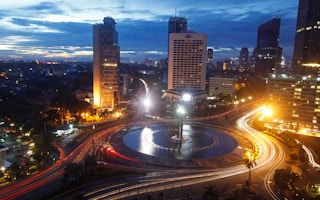For countries seeking to implement the New Urban Agenda, the new voluntary agreement on sustainable urbanisation, there are some nations leading the way. While no one can claim to have totally overhauled their cities in the seven months since the agenda was finalised, plenty can offer useful examples.
Ministers and diplomats from national governments shared their efforts thus far this month in Nairobi during speeches at the biennial board meeting of UN-Habitat. The agency is not only the United Nations’ lead on urbanisation, but it also is expected to take a coordinating role in implementation of the New Urban Agenda.
[See: Six months after Habitat III, is the New Urban Agenda gaining political traction?]
While many of the actions taken thus far might sound minor, they constitute the important first steps toward building momentum. Here are four key categories:
1. Promoting the New Urban Agenda locally
The New Urban Agenda was approved in October at a 20-year summit known as Habitat III, an event that brought some 30,000 global urbanists to Quito, Ecuador. But for all of the excitement at the time, once those participants returned home, the agreement was little known.
Just getting the word out is arguably the initial effort required before contemplating major urban policy changes. To that end, Indonesia has translated the 24-page document into its native tongue, which is not one of the UN’s official language. Last year, Malawi hosted an “urban breakfast”, an early-morning roundtable on urban issues where the minister of lands, housing and urban development made the case for the New Urban Agenda.
This month, the China Academy of Urban Planning and Design hosted an event on the New Urban Agenda on the sidelines of the Chinese government’s Belt and Road Forum in Beijing. And later this year, eThekwini municipality in Durban, South Africa, will host the annual World Cities Day celebrations, on 31 October.
2. Getting organised
Acting on urban issues can’t happen if the right people aren’t talking to each other. That requires government officials, even ones in different and perhaps politically competing ministries, to sit down at the same table and make common cause over cities. Adding civil society and academic experts to the mix, as well as important local officials such as mayors, can ensure a healthy dialogue about how to get cities right.
Turkey took that step right after Habitat III by forming its second-ever National Urbanisation Council to address urban design, financing for urban renewal, migration and the role of local governments. The council hopes to revise Turkey’s National Urban Strategy, which was adopted in 2010.
[See: With national urban policies, the process is the goal]
Nigeria took a similar step, announcing this month the reactivation of its National Habitat Committee. That body helped the country prepare for Habitat III by providing inputs to the country’s national report, a 20-year look-back, and coordinating the Africa regional meeting held in Abuja.
According to Nigerian Housing Minister Mustapha Baba Shehuri, the committee “will take up the role of sensitising, popularising and domesticating the New Urban Agenda nationwide, from national levels down to states, local governments and community levels”.
Finally, Indonesia has set up two steering committees, one on housing and another on urban development. They will be responsible, said Ambassador Soehardjono Sastromihardjo, for ensuring “that the implementations of the New Urban Agenda and the [Sustainable Development Goals] are on the right track.”
3. Hosting an urban forum
Closed-door committee meetings go only so far. Sometimes it’s best to throw open the doors and invite everyone to the party. That’s where national urban forums come in: They are an opportunity to bring everyone with a stake in cities into the same room, where they can meet face-to-face, hear each other out and share ideas.
The Caribbean, a region where planners and local officials from different countries have few opportunities to meet because they live on separate islands, held its seventh annual urban forum this month in Belize. Argentina will host a national urban forum at the end of June, just after it plays hosts to the regional forum of Latin American and Caribbean housing and urban development ministers.
[See: 2018 reporting period will prove critical for New Urban Agenda, advocates say]
Ghana, which hosted an “Africa Strategy Workshop” on implementing the New Urban Agenda in September, also is likely to have a national urban forum later this year. Malaysia, meanwhile, is going one better on everyone, by hosting the next World Urban Forum in February.
4. Starting a pilot project
When it comes time to make changes on the ground, going full speed ahead with a wholesale rollout of a national housing or urban planning scheme can be risky. That’s why countries often start with pilot projects — a test case that can indicate whether a given policy or idea makes sense at a larger scale.
The European Union is taking this approach with “pilot partnerships” for the eight topics that make up the Urban Agenda for the EU. Slovakia’s representative called the approach “a new participative way of action to tackle the challenges of European cities.” His country is coordinating the housing pilot.
[See: How to move from creating to implementing a national urban policy]
Other countries are acting more unilaterally. The Democratic Republic of Congo is three years into a pilot agro-industrial park called Bukanga-Lonzo. Urbanism and Habitat Minister Joseph Kokonyangi boasted of an 80,000-hectare eco-village going up at the site.
Ghanaian Deputy Minister Adjei Kwasi Boateng, meanwhile, heralded the country’s Urban Management Pilot Project in four metropolitan areas. The programme will address urban infrastructure investment, spatial planning, street naming, a property addressing system, urban management and the delivery of basic services.
This story was published with permission from Citiscope, a nonprofit news outlet that covers innovations in cities around the world. More at Citiscope.org










